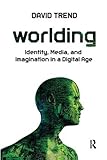Worlding : identity, media, and imagination in a digital age /
By: Trend, David
Material type: BookDescription: ix, 179 p. ; 24 cm.ISBN: 9781612052304; 1612052304 (hc. : alk. paper); 9781612052311 (pbk. : alk. paper); 1612052312 (pbk. : alk. paper)Subject(s): Internet -- Social aspects | Virtual reality -- Social aspects | Mass media and technology -- Social aspects | Identity (Psychology) and mass media | Mass media and globalizationDDC classification: 302.23 Online resources: Location Map
BookDescription: ix, 179 p. ; 24 cm.ISBN: 9781612052304; 1612052304 (hc. : alk. paper); 9781612052311 (pbk. : alk. paper); 1612052312 (pbk. : alk. paper)Subject(s): Internet -- Social aspects | Virtual reality -- Social aspects | Mass media and technology -- Social aspects | Identity (Psychology) and mass media | Mass media and globalizationDDC classification: 302.23 Online resources: Location Map | Item type | Home library | Call number | Status | Date due | Barcode | Item holds |
|---|---|---|---|---|---|---|
| REGULAR | University of Wollongong in Dubai Main Collection | 302.23 TR WO (Browse shelf) | Available | T0013941 |
, Shelving location: Main Collection Close shelf browser

|

|

|

|

|

|

|
||
| 302.23 TH ME The media and modernity : | 302.23 TR AN Transnational protests and the media / | 302.23 TR ME Media, audiences, effects : | 302.23 TR WO Worlding : | 302.23 UN DE Understanding media convergence : | 302.23 VA MA Managing electronic media : | 302.23 VA MA Managing electronic media : |
Includes bibliographical references and index.
Worlding brings ideas about "virtual" places and societies together with perceptions about the "real" world in an era of mounting global uncertainty. As mass media and the Internet consume ever-increasing portions of our lives, are we becoming disengaged from face-to-face human interaction and real-world concerns? Or is the virtual world actually bringing people closer together and making them more involved with social issues? Worlding argues that the "virtual" and the "real" are profoundly interconnected, often in ways we don't fully appreciate. Drawing on sociology, cultural studies, philosophy, media analysis, and technology studies, Worlding makes the argument that virtual experience and social networking can be vital links to utopian visions and an appreciation of the world's diversity.
Considers the impact of the internet and new media on social life, drawing on philosophy, sociology and cultural and media studies.
